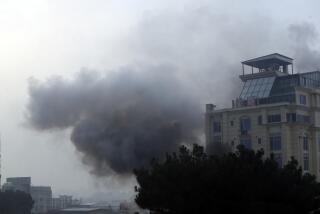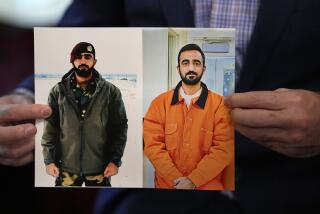IN-LAW OF AL QAEDA OPERATIVE GETS BAIL
Over the strong objections of the government, a federal judge in Orange County agreed to grant bail Tuesday for the brother-in-law of Osama bin Laden’s alleged security coordinator in a case that is stirring debate about the FBI’s use of informants.
Ahmadullah Sais Niazi, a Tustin man of Afghan origin who earned his U.S. citizenship five years ago, would be electronically monitored and confined to his home if his family can guarantee $500,000 bail. If released, he would also be restricted from traveling outside Southern California and must surrender his passport and other travel documents.
U.S. Magistrate Arthur Nakazato said he considered not granting bail and that he was troubled by an FBI agent’s testimony that Niazi considered Bin Laden “an angel,” planned to blow up buildings and showed sympathy to at least one terrorist organization.
Yet, the judge said a person cannot choose his relatives and that Niazi had not tried to flee despite knowing he had been under investigation for at least a year.
Niazi, arrested at his suburban home last week, is scheduled to be arraigned next month on suspicion of perjury, naturalization fraud, misuse of a passport obtained by fraud and making a false statement to a federal agency. He is accused of lying during his citizenship process about using aliases and failing to disclose that his brother-in-law is allegedly a security coordinator for Bin Laden and that he took a trip to Pakistan to see his brother-in-law.
In court Tuesday, FBI Special Agent Thomas J. Ropel III acknowledged that Niazi and others at his mosque did come forward to turn in a convert who “was scary to them” because he repeatedly talked about jihad and other terrorist activities. But Ropel revealed that the convert was an informant and that the FBI believed Niazi may have realized this and filed the report to protect himself.
During conversations with the informant -- some of which were secretly recorded -- Niazi initiated discussions about jihad, obtaining weapons, blowing up buildings and sending money overseas to the Afghan mujahedin, according to Ropel. Niazi also taught the informant Arabic and was preparing to send the informant to terrorist training camps in Yemen or Pakistan, Ropel said.
Shakeel Syed, executive director of the Islamic Shura Council of Southern California, said he was not surprised to learn the convert was an informant, “but glad to hear it in a court of law.”
Assistant U.S. Atty. Deirdre Eliot, who heads the anti-terrorism task force in Orange County, argued that even though Niazi is not charged with terrorism, he is a flight risk and a danger to the community. She cited evidence of terrorist sympathies and ties to terrorists.
Niazi’s sister, Hafiza, is married to Amin al-Haq, an Afghan militant who fought Soviet occupation in the 1980s with a U.S.-backed Islamic resistance force that now is branded an Al Qaeda affiliate.
Al-Haq is said to be Bin Laden’s security coordinator. He was identified by the United Nations Security Council as an Al Qaeda operative in March 2001 and listed as a “specially designated global terrorist” by the U.S. government a month after the Sept. 11 attacks. His name came up last year during the terrorism trial of Bin Laden’s driver, Salim Ahmed Hamdan. There have been recent unconfirmed reports that Al-Haq has been detained by Pakistani security forces.
According to court documents, Niazi told the FBI in an April 2008 interview that he visited relatives in Pakistan in 2005. However, the FBI determined that the trip occurred in 2004 and that Niazi had contact with Al-Haq, the court records show. On his Customs reentry form, Niazi reported taking a trip to Qatar. Niazi also is accused of failing to mention the 2004 trip during his interview for naturalization.
“Frankly, there is no amount of bail or equity in a home that can protect the citizens of this community,” Eliot told the court.
Niazi’s family and other supporters say his troubles started after he went to authorities in 2007 to report that a new Muslim convert at his mosque spoke repeatedly of jihad and organizing terrorist attacks. Afterward, the FBI tried to recruit Niazi as an informant. Niazi complained last year to officials at the Council on American-Islamic Relations and others that the FBI was intimidating him and threatening him with arrest if he didn’t help.
Outside the federal courthouse, leaders of the American Islamic council requested a formal investigation by the U.S. Justice Department into whether the FBI is trying to strong-arm Muslims into spying on their own communities, then retaliating against those who don’t cooperate.
“Many similar incidents have been reported to our office,” the group said in a letter to U.S. Atty. Gen. Eric Holder. “This apparently retaliatory persecution is a reality that many American Muslims are forced to face.”
Syed said the Niazi case raises troubling questions.
“Today our fears and concerns are retreaded again,” Syed said. “Our mosques are under active surveillance by the Federal Bureau of Investigation.”
--
--
Paloma Esquivel contributed to this report
More to Read
Sign up for Essential California
The most important California stories and recommendations in your inbox every morning.
You may occasionally receive promotional content from the Los Angeles Times.










